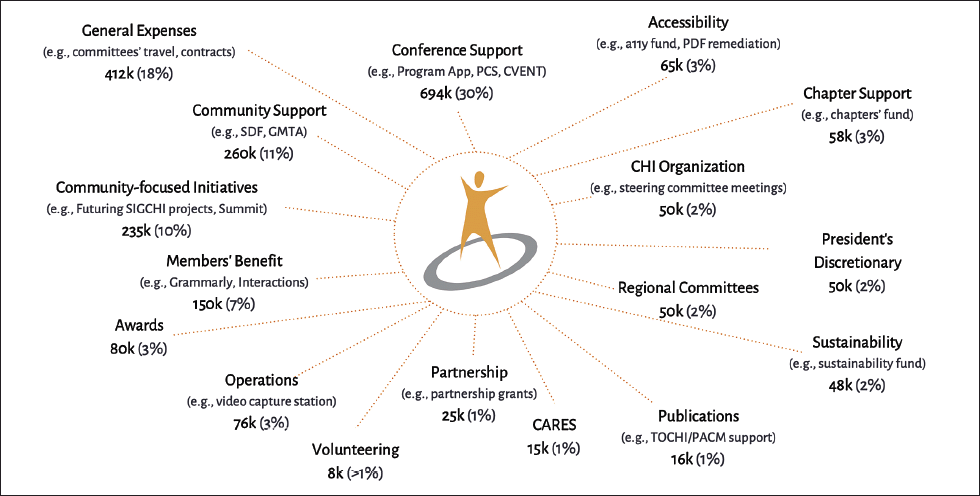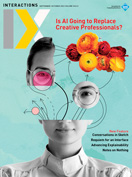Authors:
Luigi De Russis
As one of ACM's largest special interest groups, with among the most members (nearing 5,000) and conferences (26 and counting), we are also among the best funded. Representing the SIGCHI Executive Committee (EC), we share here the details of the 2023–24 fiscal year budget for SIGCHI. Our aim is to be transparent to our community about our priorities and promises.
SIGCHI is starting the current fiscal year (2023–24) with $4.3 million, with a projected income of $7.7 million and estimated expenses of $8.5 million. Our projected income sources include conferences, downloads from the ACM Digital Library, and membership dues, while our costs come from our conferences, various EC initiatives, and ACM overhead.
SIGCHI's projected income adds up to $6,439,775 from 26 conferences, mainly through registration fees and sponsorship. SIGCHI downloads from the ACM Digital Library are expected to bring $1,026,393; this is the value that ACM attaches to the projected number of SIGCHI downloads (2,742,366). Another $90,905 is expected from membership dues and subscriptions, and $106,540 from sources such as interest.
The estimated expenditure of conferences is $5,494,481 (64 percent of the budget). This includes spending on food and beverage, logistics, online platforms, and external contracts. The EC's initiatives represent 27 percent of the budget, with a planned expenditure of $2,292,000. The remaining 9 percent ($754,450) is allocated for ACM overhead, a fee that each SIG must pay as part of doing business at ACM and using its support and services.
We have recovered our footing post-Covid, and our membership is both larger and more diverse.
The EC focuses on addressing barriers to participation across the SIGCHI community to be inclusive of and responsive to its increasingly diverse membership. We prioritize accessible, safe, sustainable, equitable, global, and hybrid participation, with leadership roles, committees, and working groups dedicated to engaging community and infrastructure to put these values into practice. It is fundamental, then, that the expenses reflect and support such goals while keeping the SIG running. Our expenses for FY24 are depicted and detailed in Figure 1.
 | Figure 1. SIGCHI's FY24 budget breakdown. |
As visualized, EC expenses for the current fiscal year are divided into multiple categories. Around 30 percent of the planned expenses, amounting to $694,000, are dedicated to conference support, including the development and maintenance of conference management tools and applications, as well as support for PCS and CVENT, which are actively used by a majority of our conferences.
General expenses account for 18 percent ($412,000) of the EC budget and cover operational costs such as travel and meeting expenses, external project management contracts, and other miscellaneous items. Community support represents 11 percent ($260,000) and includes the Development Fund (for innovative initiatives driven by our community and conference) and the Gary Marsden Travel Awards.
Approximately 10 percent ($235,000) of EC expenses are allocated to community-focused initiatives organized by the EC members and their committees. Some examples of such initiatives include the upcoming SIGCHI Summit on peer review, projects proposed by the Futuring SIGCHI committee's early-career members, safety programming for SIGCHI events, hyperlocal HCI symposia that we have been colocating with in-person EC meetings, and tutorials on best practices around publishing and reviewing at SIGCHI conferences.
Membership benefits constitute 7 percent ($150,000) of projected expenses and include funds that go toward subsidizing Interactions magazine subscriptions for our members and providing discounts for services such as Grammarly and Overleaf. Accessibility receives 3 percent ($65,000) of the budget, which goes toward supporting SIGCHI conferences' accessibility requests, making accessible PDFs available in the ACM Digital Library, and providing accessibility support for EC/committee meetings.
We also allocate funds for the annual SIGCHI Awards and the President's Discretionary Fund (for unexpected emergent needs), and for nurturing chapters and regional committees, community-initiated sustainability grants, CHI conference organization, training and support for SIGCHI CARES, and various initiatives for promoting and showcasing volunteers' efforts, among other aligned priorities. More details are in Luigi's recent blog post [1].
In sum, SIGCHI's finances for 2024 are in good shape. We have recovered our footing post-Covid, and our membership is both larger and more diverse, as Neha's recent blog post captures [2]. With this positive growth trajectory, we look forward to transitioning toward consolidating and stabilizing our successful initiatives in the coming years. Stay tuned!
1. De Russis, L. The FY24 SIGCHI budget. July 2023; https://sigchi.org/the-fy24-sigchi-budget/
2. Kumar, N. Membership changes. May 2023; https://medium.com/sigchi/membership-changes-d5939fac643d
Luigi De Russis is an associate professor at Politecnico di Torino, Italy, where he conducts research at the intersection of human-computer interaction and the Internet of Things. His research topics include end-user development and digital well-being. He currently serves as SIGCHI VP for finance. [email protected]
Neha Kumar is an associate professor at Georgia Tech, where she works at the intersection of human-centered computing and global development. Her research engages feminist perspectives and assets-based approaches toward the design of technologies for and with underserved communities. She currently serves as SIGCHI president. [email protected]
Copyright held by authors
The Digital Library is published by the Association for Computing Machinery. Copyright © 2023 ACM, Inc.








Post Comment
No Comments Found